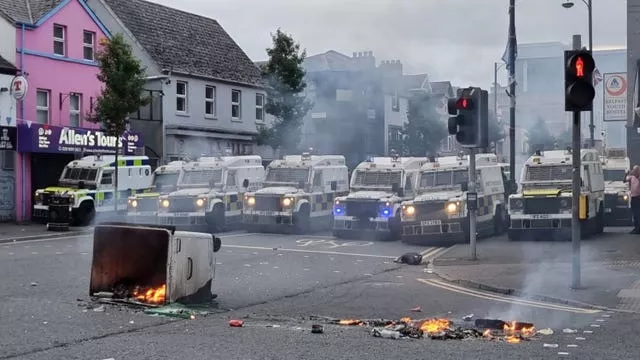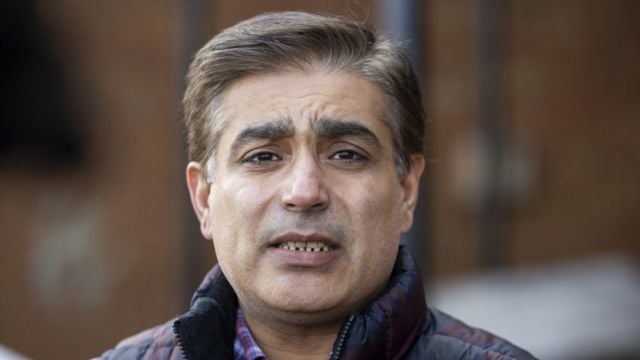A businessman has criticised the police handling of riots in Belfast, accusing officers of watching on as shops and cafes burned.
In an address to an Assembly committee at Stormont, Muhammed Atif also urged politicians to stop calling people who have moved to the North to make it their home “immigrants”.
Mr Atif, who is originally from Pakistan, has lived in the region for 16 years and his four children have all been born there.
A member of the Belfast Multi-Cultural Association, he was one of a number of representatives of ethnic minority organisations who gave evidence to the Executive Office committee on Wednesday about the disorder at the start of August and subsequent spate of race hate crimes.

Mr Atif was particularly critical of the PSNI’s handling of the rioting in Belfast that saw businesses run by members of ethnic minority communities burned.
He said officers were more concerned about gathering evidence for subsequent investigations rather than intervening to stop the destruction.
“What I don’t like about the PSNI approach is the ‘evidence gathering’ (approach),” he said.
“They stand, they watch, they let the incident happen, they gather the evidence, and then they go after them. Why would you want to do that?”
“I’m a businessman, and if somebody is burning my business place and I have five Range Rovers, police Range Rovers there, and have 30 or 40 police officers watching it.
“Honestly, what country are we living in? You’re not preventing it.
“What approach do we have? I have a very clear message for PSNI as well, and probably they hate me as much as some of the other people do, because I don’t really have filters (when I talk) – enough is enough.
“I’m a contributor in this country. I want the respect. I’m demanding that respect now, honestly, because if we don’t, things will go even worse.”
Mr Atif asked committee members why he was still considered an immigrant.
“When do I stop being an immigrant? Is there a timeline?” he asked.
“It’s been 16 years. My kids have not seen any other country as their home country, when they stop being immigrant?
“We have seen third generation, fourth generation of the immigrants in this country that are still being called immigrant.
“Do you not think it’s racist in itself? When will I be classed local? I don’t know. I’ve asked the question before.
“I’m asking it again. I will leave it with you with your good hands.
“Maybe there is something Northern Ireland Assembly can do to class us as a citizens of this country, to class us as a local. Please do not call us immigrants anymore.
“Honestly, this hurts when you look into yourself and you see that what you have done.
“I tell you what I’ve done in last one year – 200 jobs I’ve created, I’ve invested millions in the last one year in this country.
“I’ve created over 1,000 jobs over the time I’m here.
“I’ve opened and I’ve successfully ran multiple businesses and I’m proud of that. And you know how many locals I employ? 99 per cent.
“But I am not local. There you go.”
Dr Naomi Green, from the Belfast Islamic Centre, said low prosecution rates for hate crimes had created a “climate of impunity” with racists emboldened to target Muslims living in the North.
She also criticised politicians who she accused of “scapegoating” ethnic minorities by talking about “legitimate concerns” around migration when protests took place last month.
“I’d like to recognise and thank those who have done so for the positive support from many political leaders who stood firm in condemning all forms of racism, xenophobia and Islamophobia, and the community response has been incredibly heartwarming,” she told the committee.
“However, there are voices within the political and media space who continue to speak of legitimate concerns in a way that subtly excuses attacks and prejudice on minority communities in Northern Ireland.
“There is nothing legitimate about fuelling resentment and scapegoating Muslims or other minorities for complex issues like housing shortages or economic difficulties, and you will not resolve them by scapegoating us.
“Muslims should not be used as a political football or fig leaf for political feelings elsewhere. This is our home.
“Muslims, alongside other minority communities, are an integral part of this place.
“It’s time for the Assembly to take meaningful action that goes beyond statements or reports, because we’ve had so many, ensuring that inclusivity and equality are not just ideals, but lived realities.”
Beverly Simpson, from the North West Migrants’ Forum, expressed concern about the involvement of paramilitaries in racist attacks.
“Whether it is one member or 100 members, proscribed organisations are engaged in repeat harassment, intimidation, and attacks against ethnic minority communities in Northern Ireland,” she said.
“Our community members report being advised by the PSNI to consult, to negotiate or listen to community leaders that are linked to parliamentary organisations.
“This is not acceptable in any democratic, peaceful society.
“The Executive has a duty to protect the human rights of all its citizens. We need robust action on parliamentary violence in order for this to be recognised.”
Lori Gatsi-Barnett and Takura Donald Makoni from the African and Caribbean Support Organisation NI also gave evidence to the committee.
Ms Gatsi-Barnett said the definition of immigration needed to be re-examined.
“What we’re asking for is not a spotlight on us who have different heritage or come with different attributes to this community, but to be seen as one community who have many different elements, as the same singular community, who might have different cultural backgrounds and heritage, but all of us collectively working to economically, politically, socially, whether it’s housing, health, etc, working together unified but recognised as one singular community,” she said.
Mr Makoni claimed organisations dealing directly with ethnic minority communities were missing out on state funding to support their work, with funders instead preferring a “protectionist” approach in backing more long-established groups which, he claimed, were not as well equipped to deal with asylum seekers and refugees arriving in Northern Ireland.
“Organisations across Northern Ireland who do not have the cultural competency nor trauma informed approach are recipients of funding to support communities they do not have the know-how, lived experience nor the desire to service,” he said.
“Institutional racism is ubiquitous in the third sector.”







